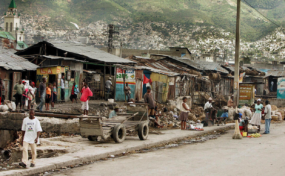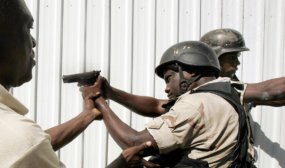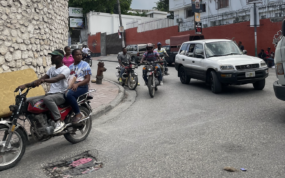As a contingent of Kenyan police officers were due to arrive in Haiti as part of a multinational police force, delays and a pending court case, which seeks to interdict their deployment, may derail the intervention.
The planned arrival of Kenyan police officers in Haiti on May 23 was abruptly postponed without official explanation. Sources within Kenya’s Ministry of Interior said that an exploratory team had found Haiti ill-prepared for the deployment. The construction of the barracks to host the Kenyan contingent was incomplete.
The arrival of the Kenyan contingent, part of the Multinational Security Support (MSS) mission, had been timed to coincide with the visit of Kenyan President William Ruto’s in Washington DC, the first state visit by an African head of state since 2008. However, during President Biden and President Ruto’s joint press conference, on May 23rd, both confirmed their commitment to the MSS without providing details about the delays, or on an official arrival date for the first African contingent.
Kenya’s deployment of police officers to Haiti comes seven months after the Kenyan parliament and cabinet approved the plan to deploy 1 000 officers to Haiti. The UN Security Council gave the go-ahead for the East African nation to lead the MSS mission to Haiti. Gangs that resemble militias, some reportedly with links to the 2021 assassination of Haiti’s president, have a stranglehold over much of the country.
A senior official in the Kenyan Ministry of Interior had confirmed that the first wave of officers would lay the ground for the arrival of the next, larger batch. (A small advance party of senior police personnel had left for Haiti on 19 May ahead of the main contingent.) However, a legal challenge and the situation in Port-au-Prince could thwart the promises made by the US, Kenya and the international community.
Another legal roadblock?
On 17 May, Ekuru Aukot, leader of Kenya’s Thirdway Alliance political party, a former Kenyan presidential candidate and opponent of Ruto, initiated a last-minute challenge in Kenya’s High Court to the anticipated fly-out of the officers, citing contempt of court and other irregularities. Aukot argues that by deploying, the government is disregarding a January 2024 court order that declared the police deployment to Haiti as unconstitutional and illegal.
This latest legal petition, the second brought by Aukot, which may block the deployment of the Kenyan force, seeks to have Ruto’s government cited for contempt of court. The High Court has scheduled 2 June as the date for the hearing. It was Aukot’s earlier court case in January that temporarily blocked the deployment on the basis that it was unconstitutional. In his judgment, Justice Chacha Mwita found that Kenya and Haiti lacked a requisite reciprocal agreement, and that the Kenyan president did not have the constitutional mandate to deploy police abroad.
Following the January court decision, Ruto and the then Haitian prime minister, Ariel Henry, signed in March a bilateral agreement to circumvent it. At the signing ceremony, Ruto said: ‘From Kenya, we are ready for this deployment, and I request all the other partners across the globe to step up so that we can provide a response in good time.’
The papers submitted for the latest court case, however, question Henry’s authority to sign the treaty in the absence of a government and parliament in Haiti, which, argues the petitioner, means that Haiti does not have the status of a reciprocating country, a prerequisite to ratifying such an agreement. It also faults Ruto for failing to publish in the Kenyan government gazette the bilateral treaty to inform the people of Kenya about the proposed deployment, as required by law. Aukot’s challenge hinges on the fact that the Kenyan public have not been informed of the content of the treaty, and Ruto was thus acting in bad faith.
President Ruto’s office has avoided any mention of this latest court bid, and has vowed to press on with the deployment. ‘The Kenyan-led mission to Haiti is ongoing, with police officers set to depart to the country in the next few weeks, having the blessing of the United Nations Security Council, which gave Kenya the mandate to lead the peacekeeping mission,’ said Foreign Affairs Permanent Secretary Korir Sing’oei on 20 May, two days after Aukot filed the case.
Mission in limbo
How Kenya’s High Court will handle this new challenge remains uncertain. The jury is out on whether the case can stand given that the deployment of some officers is already underway. However, legal experts believe that the deployment is in breach of the January court order. The situation ‘leaves the court case in limbo,’ said Nairobi lawyer Hassan Kulundu, hours after the Haiti-bound officers had been due to leave Jomo Kenyatta International Airport.
The deployment has been conducted in a highly secretive manner, arguably choreographed to avoid litigation and public protests, given the initial scepticism the mission was met with among the Kenyan public and civil society activists. Although this anti-deployment sentiment has waned lately, some elements in Kenyan society continue to express concerns over the inherent risks in the mission. The non-governmental sector fears that corruption and human rights violations witnessed in some elements of the Kenyan police service could risk being replicated in the Haiti mission.
At present, a common objective of the US and Kenyan administrations seems to be the need to deploy forces on Haitian soil as quickly as possible. Despite the recognized urgency of supporting the Haitian police through the MSS mission and the dire situation facing the Haitian people, this common sentiment must not however prevent the parties involved from communicating transparently the objectives, terms and conditions of the mission – both from an operational and political point of view. The opacity, politicking and challenges – and now delays – surrounding the mission risk undermining its legitimacy among Haitian and Kenyan society.
The latest events seem to indicate that neither the logistical aspects – the construction of the base where the Kenyan officers will be stationed – nor certain operational dimensions (the rules of engagement and the mission’s strategy) are yet in place. Other important details, such as how the multinational support mission will coordinate with the Haiti police and the Transitional Presidential Council are also missing from the picture.
Delays could also have major consequences for how criminal groups in Haiti will respond. The gangs have stepped up their strategy of systematically destroying public institutions, including police stations and prisons. The mission’s latest setbacks could convince the gangs to launch major offensives or give them additional time to prepare for the arrival of the force.
Whether or not the first Kenyan police boots will hit the ground in Haiti this week, it is critical for the international community to take stock of the opacity surrounding the deployment. Clear communication of its strategy would be the first step to the mission being able to claw back some credibility. It would be crucial, for example, to appoint a spokesperson and establish an official channel of communication with the deployment’s leadership, mirroring a Haitian representation. If the Kenyan court allows the deployment to continue, and the conditions on site are resolved, the Kenyan-led police mission will already have its work cut out combating violent armed gangs whose influence is increasingly threatening the fragile country. It does not need at the same time to have to fight off a mounting legitimacy crisis.
Subscribe to the GI-TOC Haiti Observatory (HT-Obs) mailing list to stay updated on our upcoming publications and initiatives.
Des retards et un nouveau recours en justice menacent le déploiement de la police kényane en Haïti
Alors qu’un contingent de policiers kényans devait arriver en Haïti dans le cadre de la Mission multinationale d’appui à la sécurité (MMAS), des retards et une procédure judiciaire en cours, qui vise à interdire leur déploiement, pourraient faire dérailler l’intervention.
L’arrivée prévue de policiers kényans en Haïti le 23 mai a été brusquement reportée sans explication officielle. Des sources au sein du ministère kényan de l’Intérieur ont déclaré qu’une équipe exploratoire, déployée à Port-au-Prince en début de semaine, avait signalé des lacunes logistiques rendant impossible le déploiement. La construction de la caserne devant accueillir le contingent kényan, par exemple, reste inachevée.
L’arrivée du contingent kényan, qui fait partie de la MMAS, avait été programmée pour coïncider avec la visite du président kényan William Ruto à Washington, la première visite officielle d’un chef d’État africain depuis 2008. Cependant, lors de la conférence de presse conjointe des présidents Biden et Ruto, le 23 mai, tous deux ont confirmé leur engagement envers la MMAS sans fournir de détails sur les retards, ni une date d’arrivée officielle pour le premier contingent africain.
Le déploiement de policiers kényans en Haïti intervient sept mois après que le gouvernement kényan a approuvé le plan de déploiement de 1 000 policiers en Haïti. Le Conseil de sécurité des Nations unies a donné son feu vert pour que le pays d’Afrique de l’Est dirige la mission MMAS en Haïti. Des gangs, dont certains auraient des liens avec l’assassinat du président haïtien en 2021, ont la mainmise sur une grande partie du pays.
Un haut fonctionnaire du ministère kényan de l’Intérieur a confirmé que la première vague d’officiers préparerait le terrain pour l’arrivée de la prochaine équipe, plus importante. (Un petit groupe de policiers de haut rang est parti pour Haïti le 19 mai avant le contingent principal). Toutefois, un recours juridique et la situation à Port-au-Prince pourraient mettre en péril les promesses faites par les États-Unis, le Kenya et la communauté internationale.
Un autre obstacle juridique ?
Le 17 mai, Ekuru Aukot, leader du parti politique kényan Thirdway Alliance, ancien candidat à la présidence du Kenya et opposant à Ruto, a lancé un recours de dernière minute devant la Haute Cour du Kenya contre le déploiement anticipé des officiers, invoquant un outrage à la cour et d’autres irrégularités. Aukot soutient qu’en déployant les policiers, le gouvernement ne tient pas compte d’une décision de justice datant de janvier 2024 qui déclarait le déploiement de la police en Haïti inconstitutionnel et illégal.
Cette dernière requête, la deuxième déposée par Aukot, qui pourrait bloquer le déploiement de la force kényane, vise à faire convoquer le gouvernement de Ruto pour outrage à la cour. La Haute Cour a fixé au 2 juin la date de l’audience. C’est la précédente action en justice d’Aukot, en janvier, qui a temporairement bloqué le déploiement en raison de son caractère anticonstitutionnel. Dans son jugement, le juge Chacha Mwita a estimé que le Kenya et Haïti n’avaient pas conclu d’accord de réciprocité et que le président kényan n’avait pas le mandat constitutionnel de déployer la police à l’étranger.
À la suite de la décision de justice de janvier, M. Ruto et le premier ministre haïtien de l’époque, M. Ariel Henry, ont signé en mars un accord bilatéral visant à se mettre en conformité avec cette décision. Lors de la cérémonie de signature, M. Ruto a déclaré : « Depuis le Kenya, nous sommes prêts pour ce déploiement, et je demande aux autres partenaires du monde entier de se mobiliser pour que nous puissions apporter une réponse en temps voulu ».
Les documents soumis dans le cadre du nouveau recours judiciaire remettent toutefois en question l’autorité de M. Henry à signer le traité en l’absence d’un gouvernement et d’un parlement en Haïti, ce qui, selon le pétitionnaire, signifie qu’Haïti n’a pas le statut de pays réciproque, une condition préalable à la ratification d’un tel accord. Il reproche également à M. Ruto de ne pas avoir publié au journal officiel le traité bilatéral visant à informer le peuple kényan du déploiement proposé, comme l’exige la loi. La contestation d’Aukot repose sur le fait que le public kényan n’a pas été informé du contenu du traité et que Ruto a donc agi de mauvaise foi.
Le bureau du président Ruto a évité toute mention de cette dernière procédure judiciaire et s’est engagé à poursuivre le déploiement. « La mission menée par le Kenya en Haïti est en cours, et des officiers de police devraient partir pour le pays dans les prochaines semaines, avec la bénédiction du Conseil de sécurité des Nations Unies, qui a donné au Kenya le mandat de diriger la mission de maintien de la paix », a déclaré le secrétaire permanent aux affaires étrangères, Korir Sing’oei, le 20 mai, deux jours après que M. Aukot a déposé le dossier.
La mission dans les limbes
La manière dont la Haute Cour du Kenya traitera ce nouveau recours reste incertaine. Le jury n’a pas encore déterminé si le recours peut être retenu, étant donné que le déploiement de certains agents est déjà en cours. Cependant, certains experts juridiques estiment que le déploiement en cours est en violation de l’ordonnance du tribunal de janvier. La situation « laisse l’affaire en suspens », a déclaré l’avocat Hassan Kulundu, quelques heures après que les officiers en partance pour Haïti aient quitté l’aéroport international Jomo Kenyatta.
Le déploiement a été organisé avec discrétion, sans doute pour éviter les litiges et les protestations publiques, étant donné le scepticisme initial de l’opinion publique kényane et de la société civile à l’égard de la mission. Bien que ce sentiment anti-déploiement se soit atténué dernièrement, certains secteurs de la société kényane continuent d’exprimer des inquiétudes quant aux risques inhérents à la mission. La société civile, en particulier, craint que les accusations de corruption et les violations des droits de l’homme, portées dans le passé contre certains services de police kényans, ne se reproduisent dans le cadre de la mission en Haïti.
A l’heure actuelle, l’objectif commun des administrations américaine et kényane semble être la nécessité de déployer des forces sur le sol haïtien le plus rapidement possible. Malgré l’urgence reconnue de soutenir la police haïtienne à travers la mission MMAS et la situation humanitaire catastrophique dans laquelle se trouve la capitale haïtienne, ce sentiment ne doit pas empêcher les parties impliquées de communiquer de manière transparente quant aux objectifs, termes et conditions de la mission – à la fois d’un point de vue opérationnel et politique. L’opacité, la politisation et les défis – et maintenant les retards – qui entourent la mission risquent de saper encore davantage sa légitimité auprès des opinions publiques haïtienne et kényane.
Les derniers événements semblent indiquer que ni les aspects logistiques – la construction de la base où seront stationnés les officiers kényans – ni certaines dimensions opérationnelles (les règles d’engagement et la stratégie de la mission) ne sont encore en place. D’autres points cruciaux, tels que la coordination de la MMAS avec la police haïtienne et le Conseil présidentiel de transition, manquent également à l’appel.
Les retards pourraient également avoir des conséquences majeures sur l’action des groupes criminels en Haïti. Ces derniers ont intensifié leur stratégie de destruction systématique des institutions publiques, y compris les postes de police et les prisons. Les derniers retards de la mission pourraient convaincre les gangs de lancer des offensives majeures, ou leur donner plus de temps pour se préparer à l’arrivée de la force.
Que les premiers éléments de la police kényane foulent ou non le sol haïtien cette semaine, il est essentiel que la communauté internationale prenne la mesure de l’opacité qui entoure ce déploiement. Une communication claire de sa stratégie serait la première étape pour que la mission puisse regagner un minimum de crédibilité. Il serait crucial, par exemple, de nommer un porte-parole et d’établir un canal de communication officiel avec les responsables du déploiement, en miroir d’une représentation haïtienne. Si le tribunal kényan autorise la poursuite du déploiement et que les conditions sur place sont réunies, la mission dirigée par le Kenya aura déjà fort à faire pour lutter contre les gangs. Elle n’a pas besoin de lutter en même temps contre une crise de légitimité croissante.



